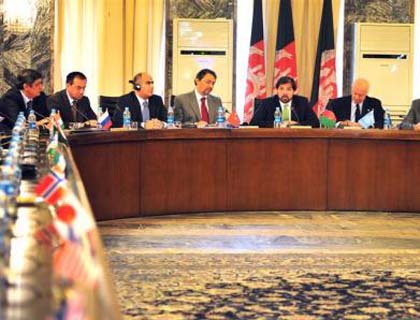KABUL - Some Afghans believe the Istanbul conference would bring no positive change to Afghanistan's security situation, but others expect key decisions on the country's future.
The regional cooperation conference will deliberate on issues related to security transition, including the recruitment, training, and equipment of Afghan forces, as well as the reconciliation process.
The conference will also focus on building up trust among regional and Central Asian countries for greater cooperation in the field of security.
Representatives from 15 countries including the US, France, England, India, Pakistan, Iran and Central Asian counties, would attend the moot.
"A number of such conferences on Afghanistan's problems have been organized in foreign countries, but the problems remain unresolved," said a resident of the third Macro Rayan residential area, Mansoor Ahmad.
Like the previous gatherings, the Istanbul conference would yield no results, Ahmad said, calling Afghanistan's woes a result of interference from neighboring countries. Such meetings had no benefit until neighbors took practical steps to stop meddling, he added.
A similar view was expressed by a resident of the Tehya Maskan area, Jamal Kakar, who said foreign countries had held out promises at previous conferences, but none of them could be implemented. He said promises would be made at the Istanbul conference, too, but there was a little hope of those commitments being honored.
Nangarhar's Hesarak district development council chief, Dr. Mohammad Naeem, said if participants did not receive guarantees of non-interference from neighboring countries, the meeting would fizzle out. He claimed the international community had evidence of Pakistani and Iranian meddling in Afghanistan.
In southern Zabul province, Mahboob Mohabbat, who heads a youth organization, predicted the Istanbul conference would be a failure because most of participating countries had differences.
He said the already tense relations between Pakistan and the US had further deteriorated, while there was an ongoing tension between Iran and Saudi Arabia. Until Afghans were supplied with bombs and guns, the security situation would remain unchanged, he warned.
A writer in northern Kunduz province, Gul Rahim Niazmand, said previous conferences on Afghanistan had not been fruitful because the promises made there were not executed. He acknowledged the Istanbul conference was an important event, but it would not succeed until a proper mechanism for implementation of pledges was evolved.
But a Mazar-i-Sharif resident, Abdul Jabbar, attached great expectations to the moot, saying insecurity in Afghanistan was an internal issue and a homegrown solution should be found to it. He believed the situation could improve if the country was economically developed.
A Kabul resident, Khushal Khan, described the conference as a special meeting on the pledges made at previous gatherings. He said the meeting could be fruitful if an emphasis was placed on the implementation of past pledges.
Zarghona, a resident of Pul-i-ALam, the capital of central Logar province, was also upbeat about the conference yielding positive results. She said the world had realized who was behind problems in Afghanistan. "Pakistan is behind insecurity and the neighboring country should be pressurized to stop interfering in our affairs," she demanded.

